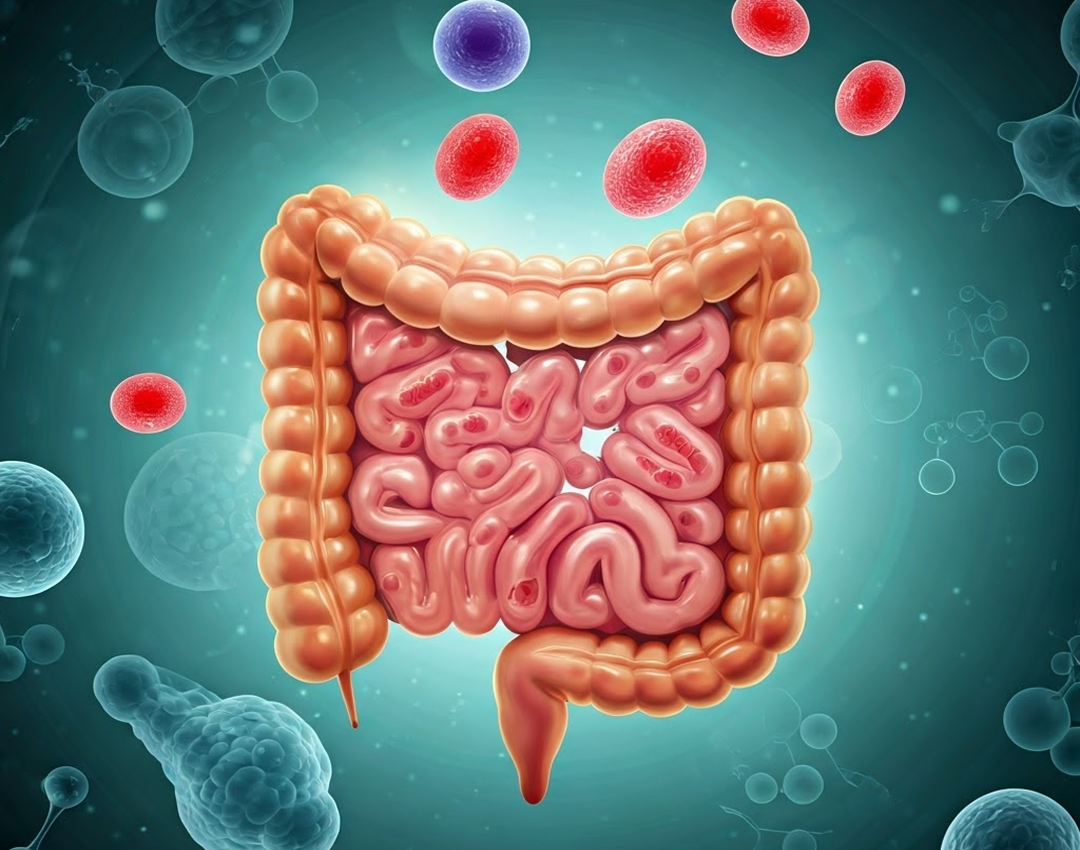Key Highlights
- The gut microbiome is key for a healthy gastrointestinal tract and a strong immune system.
- Candida albicans is a common fungus in the gut microbiota. It is usually harmless, but it can cause issues if the balance is disrupted.
- Antibiotics and poor eating habits can upset the balance of gut microbiota. This could lead to Candida overgrowth and other health problems.
- When Candida forms a biofilm, it becomes stronger and can stay in the gut longer.
- To improve gut health and manage fungal growth, you can take probiotics and change your diet.
Introduction
Your gastrointestinal tract is home to trillions of tiny living things called the gut microbiome. One type of fungus found in this microbiome is called Candida albicans. This fungus can help your immune system. However, too much of it can cause infections. When your gut microbiome is not balanced, Candida can grow too much. This can lead to digestion problems and serious fungal infections. It's important to understand how the gut microbiome and candida overgrowth work together. By learning about this, we can find out how to keep our gut health in good shape. So, what does a healthy gut microbiome look like?
Overview of Gut Microbiome
The human gut microbiome is important for digestion and the immune system. It consists of several parts, like gut bacteria, viruses, and fungi. These parts work together to protect our bodies and support our metabolism. When there is an imbalance in these components, it can lead to serious health problems, such as fungal infections.
Candida albicans is a normal part of the gut microbiota. This shows how delicate our relationships with microbes can be, especially with Staphylococcus aureus. A healthy gut microbiome prevents Candida from causing issues. It also supports our body's functions, even as our environment changes.
Definition and Importance of Gut Microbiome
The gut microbiota consists of bacteria, fungi, viruses, and other tiny life forms in the human gut. These small creatures work with the host cells. They assist in digestion, help absorb nutrients, and keep a healthy immune system.
In this system, Candida albicans plays two important roles. First, it helps the immune system with innate immunity. But if it grows too much, it can cause problems. A healthy gut needs different types of microbes. These microbes protect intestinal epithelial cells from germs and help the body do important tasks.
You can learn about this role better when things are not right. We refer to this problem as dysbiosis. During dysbiosis, bad organisms like Candida albicans can grow more easily. Keeping a healthy gut microbiota is important. A balanced gut can lower the chances of fungal infections and other gut problems.
Factors Influencing Gut Microbiome Balance
Your eating habits are really important for keeping your gut microbiome healthy. Food that is high in dietary fiber and fatty acids is good for your gut health. However, eating too much sugar can cause Candida overgrowth.
Antibiotics can be risky. They are useful for treating bacterial infections. But they can also damage the gut microbiota. When that happens, it may let Candida albicans grow. If antibiotics are misused, they might weaken the gut's natural defenses. This can lead to more fungal infections in the gastrointestinal tract.
The immune system is key for our health. A strong immune response can fight germs and stop fungal infections. If the immune system is weak, harmful germs, like Candida, can get past our defenses. These germs can enter host cells and form biofilms. This means it's very important to have good immune modulation to keep our gut health.
Candida Overgrowth Explained
Candida overgrowth occurs when Candida albicans, a normally harmless yeast, becomes harmful in the gastrointestinal tract. This generally happens due to issues like gut dysbiosis, a weak immune system, or an imbalance created by antibiotics. Such problems can harm the health of your digestive system.
If Candida increases a lot, it can cause issues like a stomachache or serious fungal infections. By learning what causes this and taking steps to stop it, you can manage Candida more effectively. This will help keep your digestive tract healthy in the long run.
What is Candida and its Role in the Body?
Candida albicans is a kind of fungus that resembles yeast. It is commonly present in the human body and is part of the gut microbiota. This fungus usually gets along well with other microbes. It helps support the immune system and maintains a healthy balance of microbes.
Candida can change its shape into something called hyphae. This change affects how it interacts with host cells. Changes in the environment typically cause these transformations. They can result in fungal infections, especially in people who have weak immune systems.
Candida albicans can be harmful because it hides from our immune system. It can enter epithelial cells and cause serious infections in the body. This shows how important it is to maintain a healthy balance of microbes to lessen its bad effects.
Symptoms and Causes of Candida Overgrowth
Having too much candida can cause issues like bloating, feeling tired, and stomach pain. If you don’t treat it, it can lead to a serious infection that hurts your gut health. These problems often relate to an imbalance in the gut microbiome.
Some risk factors can cause problems. A long course of antibiotic treatment can reduce gut bacteria. A weak immune system is another risk factor. This is often seen in IBS patients or those with autoimmune issues. A bad diet and stress can also contribute to overgrowth. They can weaken the body's natural defenses.
To maintain good gut health, it is important to consider what affects your immune response. This way, you can lower the chances of issues like fungal dysbiosis.
Interactions Between Gut Microbiome and Candida
The gut microbiome is important for how Candida albicans acts in the gastrointestinal tract. The bacteria in your gut can change how Candida grows. They can also influence the creation of things like hyphae and biofilms. Overall, these bacteria help reduce the harmful effects of Candida.
When fungi are not balanced, they can affect the nearby anaerobic bacteria. This means they influence each other. If we understand these connections, we can find ways to reduce fungal overgrowth and improve gut health.
How Gut Microbiome Affects Candida Behavior
Gut bacteria have an important role in controlling Candida albicans. They fight for food and help improve the immune system. Some substances made by these bacteria can prevent Candida from turning into a more harmful form, like hyphae.
When this protection stops, it can lead to Candida infections. This often happens when we lose good gut bacteria. We might lose these bacteria after using antibiotics or by not having a healthy diet. Without these good bacteria, Candida can grow fast. This can cause fungal infections and help create biofilms, which make treating the infections more difficult.
To handle Candida albicans, several types of microbes are needed. A healthy gut flora is important to keep fungal infections from happening.
Role of Dysbiosis in Candida Proliferation
Gut dysbiosis occurs when the balance of microbes in your body gets upset. This can lead to too much Candida growing. Antibiotics and unhealthy habits often lower the good bacteria. Because of this, there is more fungal growth.
When there is too much fungus, it can hurt the cells in the gut. This makes it easier for Candida albicans to spread deeper into the gut. As a result, inflammation happens in the digestive tract. This can then cause serious infections that can be bad for health.
You can restore the balance of gut bacteria by using probiotics and adjusting your diet. This can help manage fungal populations and lessen problems caused by Candida infections in your intestines.
Biofilm Formation by Candida
Biofilms are protective layers created by Candida albicans. They help the fungus defend itself against the immune system and antifungal drugs. These layers also make the digestive tract a complex environment.
When Candida forms these biofilms, they become harder to get rid of. Understanding how this process works is important for creating new treatments.
Understanding Biofilms and Their Significance
Candida albicans forms biofilms to help it survive better. These biofilms strengthen its cell wall and help it avoid the immune system. Because biofilms can resist antifungal drugs, Candida can keep living even when treatments do not work.
In the gut, Candida albicans creates biofilms. These biofilms help it attach to the cells that line the intestine, which are called intestinal epithelial cells. This can lead to long-lasting fungal infections. Many things can influence this problem. That is why it is important to break down these biofilm structures for successful treatment.
Taking steps to avoid problems, like using probiotics, can help keep biofilms from forming. This shows how important gut health is in managing the bad effects of Candida.
Mechanisms of Biofilm Resistance and Persistence
Biofilm formation helps Candida protect itself from the immune system. It has special structures on its cell surface. These structures hinder the immune responses from working properly.
These structures can fight against antifungal treatments. Because of this, Candida can stay in the digestive tract for a long time.
New ways to fight against biofilm resistance can lead to better results in care. This shows that we need to do more research on how to manage biofilms when treating fungal infections.
Preventative Strategies Against Candida Overgrowth
To stop problems, you can lower the risk of fungal infections, such as Candida overgrowth. A great way to boost your gut health is by eating foods that are good for your gut. This means eating foods that are high in fiber and avoiding processed sugars.
Adding probiotics can be very helpful. They raise the good bacteria in your body. This improves your immune system. A stronger immune system serves as a shield in the gastrointestinal tract. It helps keep harmful fungal populations at bay.
Dietary Changes for a Healthier Gut Microbiome
A healthy diet is vital for a strong gut. Foods rich in fiber help good bacteria in your gut. This support keeps fungal overgrowth, such as Candida albicans, in check. Fatty acids, especially omega-3, can reduce inflammation in the digestive tract.
It’s really important to avoid sugary and processed foods. Eating too much sugar can cause Candida albicans to grow in your gut. This can increase the chances of it getting too high.
Eating a balanced diet is very important. You should include vegetables, whole grains, and healthy fats in your meals. A diet like this helps your gut microbiome. It supports good bacteria and keeps the fungi under control.
Probiotics and Their Role in Controlling Candida
Probiotics are helpful live bacteria that can benefit you. They play a key role in maintaining a healthy gut. These bacteria help keep the right balance of microbes in your gut. A balanced gut is crucial for stopping fungal infections, such as Candida overgrowth.
Lactobacillus is a useful probiotic. It helps the immune system and stops Candida from forming biofilms. Probiotics can also bring back healthy bacteria that might go away when you take antibiotics.
Adding fermented foods or supplements to your meals can improve your gut health. This easy change can reduce the amount of fungi in your body and make your immune system stronger.
Treatment Options for Candida Overgrowth
Treatments for candida overgrowth involve antifungal medications and natural remedies. Medical treatments aim to stop the fungi from growing. Meanwhile, natural methods focus on keeping the problem from happening in the first place.
When choosing a method, you should think about each person's symptoms and health. Doing this can help you get the best results. It's also smart to seek regular advice from a professional. This can help you manage everything better.
Conventional Treatments and Their Efficacy
Antifungal medicines, like Fluconazole, help prevent the growth of fungal cells. These drugs are used to treat serious infections caused by fungi, especially invasive fungal infections like Candida. They work by focusing on the harmful cell walls and biofilms of the fungi.
Candida diets are effective when you use antifungal medicines. These diets cut out sugar and processed foods. Making these changes can reduce fungal populations in your body. If you change your diet and keep following your medical treatments, you may notice better results.
It is important to watch for symptoms and check how well treatments are working. This helps make sure that treatment plans are effective. It also helps reduce the long-term risks of fungi spreading.
Alternative and Holistic Approaches
Natural remedies and healthy lifestyle changes can help with candida overgrowth. Eating probiotics regularly can increase the good bacteria in your body. This is important to fight fungal infections.
Holistic medicine focuses on reducing stress. This is key for being healthy and having a strong immune system. IBS patients can improve their health by practicing meditation and following a balanced daily routine. These actions can help lessen their symptoms.
Using these methods together can be very helpful for a long time. They support your gastrointestinal tract health, even after you finish the main treatments or other usual methods.
Recent Scientific Advances
New research shows we are getting better at treating fungal infections. We are also improving the gut microbial metabolome. Scientists feel hopeful that these new treatments will better target Candida biofilms.
New scientific findings aim to better microbiome therapy. They also focus on treating Candida infections. This will help people with fungal dysbiosis feel better.
Latest Research on Gut Microbiome and Candida
Recent studies show how gut microbes interact with Candida albicans. They affect what it does. The gut microbial metabolome gives clues for new treatments.
Research shows that products from bacteria can help reduce the negative impacts of Candida. This suggests that using the microbiome might be beneficial. By boosting good microbes, we can strengthen our defense against fungal infections.
These results create new opportunities for special treatments. They show how crucial new scientific discoveries are for improving gut health.
Innovations in Biofilm Management
New ways are being developed to deal with biofilms, especially those created by Candida albicans. A recent study discovered weak spots in the walls of fungal cells.
Enzyme treatments can lower the strength of biofilms. This change can make antifungal drugs work better.
Managing biofilms is very important to reduce tough fungal infections. This shows that we need to do more research in this area. We should work on better treatments for the germs that form biofilms.
Conclusion
It’s important to understand how the gut microbiome connects to candida overgrowth to feel better. A healthy gut microbiome helps with digestion and prevents Candida from growing and forming biofilms. You can boost your gut health by changing your diet, taking probiotics, and exploring other treatments. Staying updated on new research can help you make better health decisions. If you want to enhance your gut health, you can consult our experts today.
Frequently Asked Questions
What are the common signs of an unhealthy gut microbiome?
A stomach with an unhealthy gut microbiome can cause bloating, tiredness, and issues like irritable bowel syndrome (IBS). These signs show that the microbes in your gut are not balanced. If you don't fix this problem, it can lead to more infections in the gastrointestinal tract caused by fungi and create other health problems.
How does Candida overgrowth affect overall health?
Candida overgrowth can be bad for the immune system. This problem happens more in people who have a weakened immune system. It can make you feel tired all the time, which is not good for your health. In serious cases, it might lead to infections in the body. This can affect digestion and other important functions.
Can lifestyle changes alone manage Candida overgrowth?
Changing your lifestyle can help with mild candida overgrowth. Begin by changing your diet. You should also try to lower your stress and exercise more often. If your candida overgrowth is worse, you might need antifungal treatments in addition to these changes to get better results.
What are the risks of untreated Candida overgrowth?
Not taking care of Candida overgrowth can raise the risk of serious fungal infections and other health problems. It may weaken your immune system and cause digestive issues. This is why visiting a doctor for an evaluation is very important.
How often should one evaluate their gut health?
Checking your gut health should be a normal part of your doctor visits. It's important to pay attention to signs like stomach pain for better digestion. This practice can also help reduce the risks associated with microbial imbalances.
Impact of Lifestyle on Gut Health
A lazy lifestyle, bad eating habits, and drinking too much can hurt your gut health. These behaviors change the balance of gut bacteria. As a result, they raise the risk of fungal and bacterial infections.
Role of Stress and Sleep on Gut Microbiome
Stress raises cortisol levels. A lower variety of microbiomes affects gut health. Not getting enough sleep harms the balance of microbes. This shows that controlling stress and improving sleep is important for good gut health.
Exercise and its Impact on Gut Health
Staying active is very good for your tummy. It helps you use the bathroom easily and keeps your gut healthy. Exercise also helps the good bacteria in your gut. This can lower the chances of having stomach issues from too many or too few bacteria in your gut.
The Future of Gut Health Research
New technologies and predictive models will support research in gut health. They will look at the link between the gut and the brain. This means we can build better tools for finding problems and making treatments more personal.
Emerging Trends and Potential Discoveries in Gut Microbiome Studies
New research is looking at genetic mapping, microbiome treatments, and personalized medicine. The goal is to address problems connected to microbes. These new concepts offer hope for better ways to treat issues with the gut and the body.



